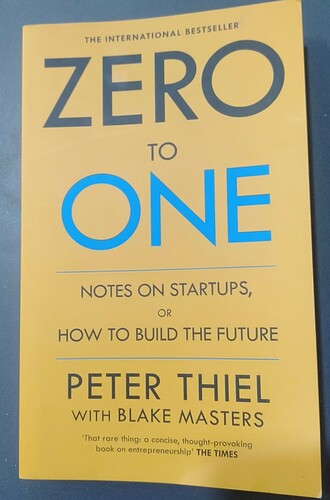The book ‘ZERO to ONE’ is authored by Peter Thiel. Peter Thiel is an entrepreneur and investor. He co-founded PayPal and Palantir, made the first outside investment in Facebook, funded companies like SpaceX and LinkedIn.
Few of my takeaways from this book are:
A great business is defined by its ability to generate cash flows in the future. Numbers alone won’t tell you the answer instead you must think critically about those qualitative characteristics of your business.
Brand, scale, network effects and technology in some combination define a Monopoly, but to get them to work, you need to choose your market carefully and expand deliberately.
It was much easier to reach a few people who really needed our product then to try to compete for attention of large scattered individuals. The perfect target market for a startup is a small group of particular people concentrated together and served by few or no competitors.
Once you create and dominate a niche market, then you should gradually expand into related and slightly broader markets. Amazon shows how it can be done. Jeff Bezos’s founding vision was to dominate all of online retail, but he very deliberately started with books.
Sequencing markets correctly is underrated and it takes discipline to expand gradually. The most successful companies make the core progression – to first dominate a specific niche and then scale to adjacent markets -a part of their founding narrative.
It’s much better to be the last mover – that is, to make the last great development in a specific market and enjoy years or even decades of monopoly profits. The way to do that is to dominate a small niche and scale up from there, towards your ambitious long- term vision.
A business with a good definite plan will always be underrated in a world where people see the future as random. You should focus relentlessly on something you are good at doing, but before that you must think hard about whether it will be valuable in the future.
An entrepreneur makes a major investment just by spending his time working on a startup. Therefore, every entrepreneur must think about whether his company is going to succeed and become valuable. When you choose a career, you act on your belief that the kind of work you do will be valuable decades from now.
The business version of a contrarian question: what valuable company is nobody building? Every correct answer is necessarily a secret: something important and unknown, something hard to do but doable. If there are many secrets left, there are probably many great companies yet to be started.
The best place to look for secrets is where no one else is looking. If you find a secret, your face a choice: Do you tell anyone? Or do you keep it to yourself? Answer is: whoever you need to, and no more. In practice, there’s always a golden mean between telling nobody and telling everybody- and that’s a company. The best entrepreneurs know this: every great business is built around a secret that’s hidden from the outside.
Startups don’t need to pay high salaries because they can offer something better: part ownership of the company itself. Equity is the one form of compensation that can effectively Orient people towards creating value in future. Early investors usually get the most equity because they take more risk, but some later strategic investors might be even more crucial to a venture’s success.
Talented people don’t need to work for you; they have plenty of options. You should ask yourself a more pointed version of the question: why would someone join your company? They might be attracted by equity stakes or high-profile responsibilities.
You will attract the strategic investor you need if you can explain why your mission is compelling: not why it’s important in general, but why you are doing something important that no one else is going to get done. You should be able to explain why your company is unique match for them.
The most valuable kind of company maintains an openness to invention that is most characteristic of beginnings. If you get the founding moment right, you can do more than create a valuable company: you can steer its distant future towards the creation of new thing instead of the stewardship of inherited success.
Good enterprise sales strategy starts small, as it must: a new customer might agree to become your biggest customer, but they will rarely be comfortable signing a deal completely out of scale with what you have sold before. Once you have a pool of reference customers who are successfully using your product, then you can begin the long and methodical work of hustling toward ever bigger deals.
All happy companies are different each one earns a Monopoly by solving a unique problem. All failed companies are the same, they fail to escape competition. Creative Monopoly means new products that benefit everybody and sustainable profits for the creator. Competition means no profit for anybody, no meaningful differentiation and a struggle for survival.
Monopolies drive progress because the promise of years or even decades of monopoly profits provide a powerful incentive to innovate. Then monopolies can keep in innovating because profits enable them to make the long-term plans and to finance the ambitious research projects that firms locked in competition can’t dream of.
| Subscribe To Our Free Newsletter |


